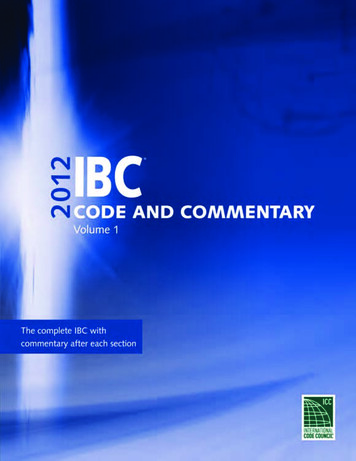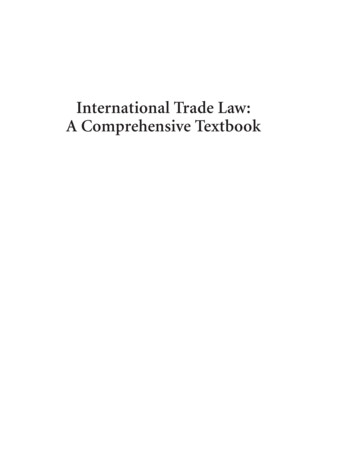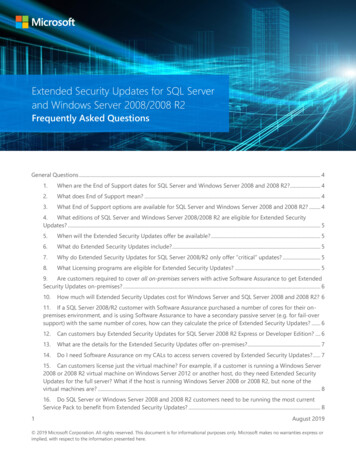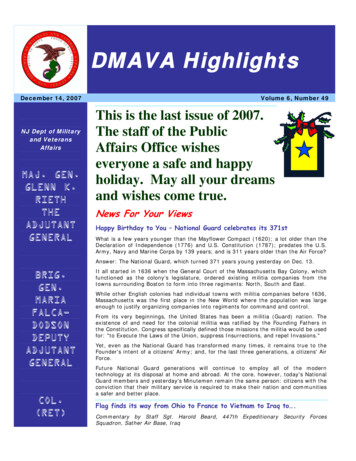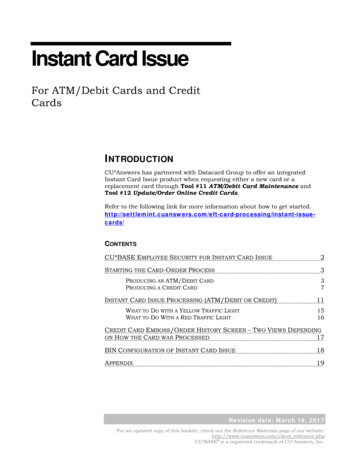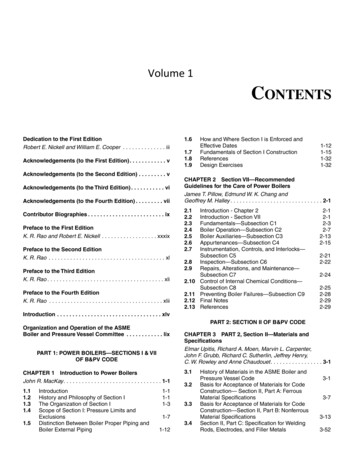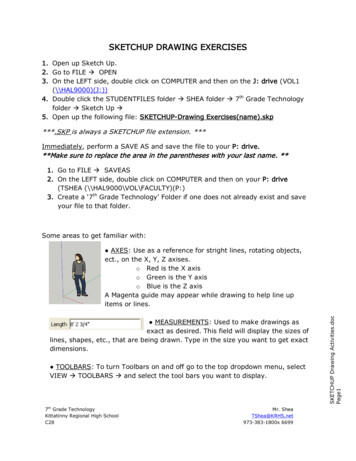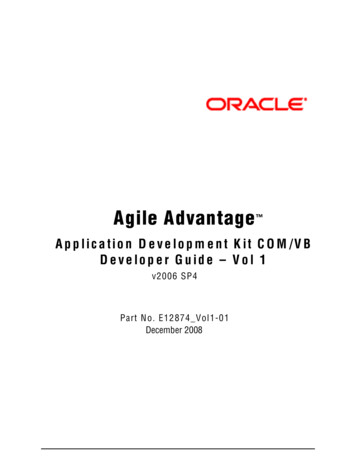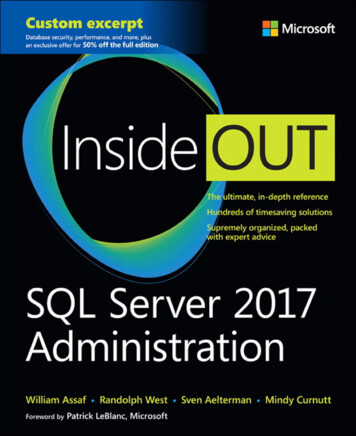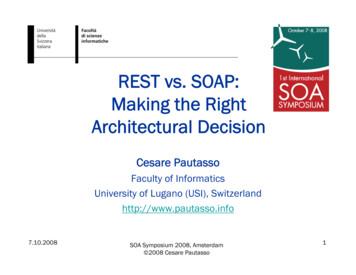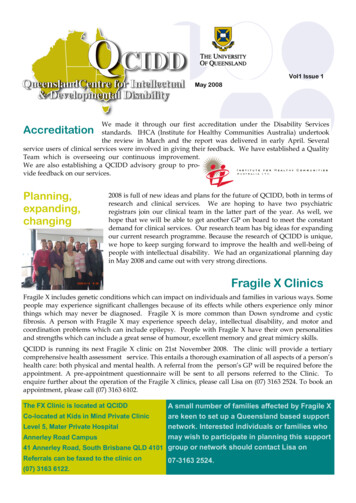
Transcription
Vol1 Issue 1May 2008We made it through our first accreditation under the Disability Servicesstandards. IHCA (Institute for Healthy Communities Australia) undertookthe review in March and the report was delivered in early April. Severalservice users of clinical services were involved in giving their feedback. We have established a QualityTeam which is overseeing our continuous improvement.We are also establishing a QCIDD advisory group to provide feedback on our 008 is full of new ideas and plans for the future of QCIDD, both in terms ofresearch and clinical services. We are hoping to have two psychiatricregistrars join our clinical team in the latter part of the year. As well, wehope that we will be able to get another GP on board to meet the constantdemand for clinical services. Our research team has big ideas for expandingour current research programme. Because the research of QCIDD is unique,we hope to keep surging forward to improve the health and well-being ofpeople with intellectual disability. We had an organizational planning dayin May 2008 and came out with very strong directions.Fragile X ClinicsFragile X includes genetic conditions which can impact on individuals and families in various ways. Somepeople may experience significant challenges because of its effects while others experience only minorthings which may never be diagnosed. Fragile X is more common than Down syndrome and cysticfibrosis. A person with Fragile X may experience speech delay, intellectual disability, and motor andcoordination problems which can include epilepsy. People with Fragile X have their own personalitiesand strengths which can include a great sense of humour, excellent memory and great mimicry skills.QCIDD is running its next Fragile X clinic on 21st November 2008. The clinic will provide a tertiarycomprehensive health assessment service. This entails a thorough examination of all aspects of a person’shealth care: both physical and mental health. A referral from the person’s GP will be required before theappointment. A pre-appointment questionnaire will be sent to all persons referred to the Clinic. Toenquire further about the operation of the Fragile X clinics, please call Lisa on (07) 3163 2524. To book anappointment, please call (07) 3163 6102.A small number of families affected by Fragile XCo-located at Kids in Mind Private Clinicare keen to set up a Queensland based supportLevel 5, Mater Private Hospitalnetwork. Interested individuals or families whomay wish to participate in planning this supportAnnerley Road Campus41 Annerley Road, South Brisbane QLD 4101 group or network should contact Lisa onThe FX Clinic is located at QCIDDReferrals can be faxed to the clinic on(07) 3163 6122.07-3163 2524.
QCIDD aims to improve the health and well being of Queensland adultswith intellectual and developmental disabilities through:clinical practiceeducation, andresearchUniversity Of QueenslandQCIDDUniversity of QueenslandMater HospitalSouth Brisbane Q 4101Phone: 61-7-31632412Fax: 61-7-31632445E-mail: qcidd@uq.edu.auFor Adults with IntellectualDisabilityResearch, Education , Advocacyand Clinical ServicesQCIDD provides clinical services at no cost to adults with intellectual ordevelopmental disability who are 17 years and older.QCIDD’s clinical service is not intended to replace your generalpractitioner. Instead our service provides a comprehensive healthassessment, with referral back to your GP and others (for example,medical specialists or allied health professionals). The comprehensivehealth assessment entails a thorough examination of all aspects of aperson’s health care: both physical and mental health. It usuallyinvolves 3 one-hour appointments and further follow-up and reviewappointments as required.Our doctors are general practitioners who have a special interest andexpertise in the health care of people with intellectual disability. At thesame time, they are not experts in every area and our clinical service islimited. As the QCIDD clinic is a small part of the overall work ofQCIDD, we are only able to offer a limited number of clinicappointments each week and waiting lists can be quite lengthy.We can provide:We cannot provide:Health assessment and reviewAdvice regarding your health care24 hour coverLimited follow up as outpatientEmergency response or crisisinterventionSupport for primary health services such asyour regular GP and other medicalpractitionersReferral and advice to assist you to link withother services and health professionalsAdvocacy in the healthcare system or adviceabout how to get the best from the healthsystemLiaison with key support services IntensiveBehaviour Support Teams.QCIDD goes bilingualIn-patient assessment (our doctorsdo not have admitting rights tohospital)Intensive follow-upIQ assessmentsFull functional or behaviouralassessments by psychologistQCIDD has just published an article about sexual health ofpeople with intellectual disability in the Mexican Journal ofPublic Health. Just recently, we gave our first presentation in Spanish about intellectualdisability and the work of QCIDD to the Seventh Day Adventist Church. We are keen tocontinue publishing in Spanish which is now the second most commonly spoken languagein the world. Recent links with the Pan American Health Organization PAHO may wellcement our relationship with the Spanish-speaking world.Page 2
Working with the World Health OrganisationIn June 2007, Associate Professor Lennox was approached by the World HealthOrganization (WHO) to be the lead author on a chapter in the upcoming WorldReport on Disability and Rehabilitation. A/Professor Lennox and Miriam Taylorare leading their contributing authors in writing a section of a chapter onMainstream Health Interventions (for all disabilities in all countries) for thisreport.The First WorldReport onDisability andHealth will bereleased inSeptember 2008and QCIDD ispart of it!Dr Lennox’s contributing authors to the World Report include:Professor Fabricio Balcazar, University of Illinois Chicago, USAProfessor Lisa Iezzoni, Harvard Medical School, Boston, USADr Michele Foster, University of Queensland, AustraliaAssociate Professor Jennifer Jelsma, University of Cape Town, SouthAfricaAssociate Professor Robert Kohn, Brown University, Illinois, USALearning more about Facilitated CommunicationMatthew Wilson, Senior Speech Pathologist from Disability Services Queenslandcame in March to talk about his long experience in assisted communication forpeople with high support needs.Latest PresentationsDr Madonna Tucker has been running the Challenging Behaviour Mentoring Programme this year. In April,she also presented at the Halwyn Centre discussing QCIDD and the services provided. Additionally,Dr Tucker continues her close work with Disability Services Queensland in training around challengingbehaviour issues.Our staff continue the teaching programme at the University of Queensland in the medical, psychiatric,nursing, social work and occupational therapy undergraduate programs. This year Dr Lisa Bridlepresented to students at the Queensland University of Technology in Disability and Human Services.Our focus on providing information to community based services continues with Dr Lisa Bridle talking atthe Kyabra Future Accommodation Expo, and Lyn McPherson and Miriam Taylor speaking to Westcare.Page 3
Meet our staffQCIDD is proud of its staff who have so many skills, backgroundsDr Nicholas Lennox (Associate Professor and Director)Nick is a researcher, educator, advocate and clinician. He has specialised in the health ofadults with intellectual disability since 1992. He trained in general practice and also for atime in psychiatry.He has developed several interventions to improve the health of people with intellectualdisability. They include the CHAP (Comprehensive Health Assessment Program) review; the Ask health diary; the first whole of life handbook on health people with intellectual disability; a dual diagnosis educational kit, and a website and book on how tomanage Diabetes.He has been instrumental in the IASSID (International Association for the Scientific Study of IntellectualDisability) ratification of health guidelines and has successfully advocated for systemic change at local,state, national and international level. This includes the adoption of the CHAP health review process bymost state governments and many NGOs across Australia and overseas. He has also been instrumentalwith others in the successfully advocating for of a health assessment Medicare payment system to supportGPs to perform these assessments on people with intellectual disability. He is the current President of theAustralian Association of Developmental Disability Medicine (AADDM). Dr. Lennox has publishedwidely in national and international journals.Nick is the father of four and a keen cyclist.DellHeleDell is the full-time personal assistant to Dr Lennox. She has been with QCIDDsince 1999 in various administrative support positions for projects including DSQCHAP study, Dual Diagnosis Education, Training and Needs Analysis andPAS-ADD. Dell also contributes to the Quality Team and keeps us going with herdelicious cakes! Dell is a mother of two.Ros MurrellRos is key to the Clinical Services Team. She has been withQCIDD for more than 6 years on various projects includingAdvocacy and Health, Endeavour CHAP Study and Diabetes. Sheis the mother of two, grandmother of two and an Italophile havingspent many years in Italy.Dr Lisa BridleLisa is Clinical Coordinator of QCIDD. This role includes providing phone/emailconsultation on QCIDD’s clinical service and linking people to other appropriate supports.Lisa has been very involved in the development of QCIDD’s quality systems andaccreditation.Page 4Lisa has worked in a variety of social work positions, including community development,counselling, domestic violence support work, community education and universityteaching. Lisa is the mother of three children and since the birth of her son, Sean, she hasbeen an active member of a number of disability support and advocacy organisations,including the Down Syndrome Association of Queensland. Lisa’s research interests include:disability bioethics (particularly the ethics of prenatal diagnosis) and family experiences ofdisability and models of family support. Lisa is passionate about working to build acommunity where people with disability would routinely find welcome, and where theirgifts and contributions would be justly recognised.
Vol1 Issue 1Lyn McPhersonLyn came to QCIDD from the University of QueenslandCancer Prevention Research Centre with a background inlibrarianship and public health. She is the manager of the AskProject which is funded by the NH&MRC for five years. Lynis the mother of two.The Ask Project currently has three talented part-time researchassistants, Sandi Meibusch, Julianne Yates and Lorraine Connelly.Dr Madonna TuckerMadonna is a psychologist, member of the Clinical team, and the initiator ofthe Challenging Behaviour Mentoring Programme. She is actively involved inthe teaching programmes. Madonna is mother of two.Dr Gillian EastgateGillian has particular interests in intellectual disability, sexual health, familyplanning, indigenous health, alcohol and drug medicine, and teaching(Medical students and General Practice Registrars). At QCIDD she doesclinical work and has written several educational articles for AustralianFamily Physician. She is also a contributing author to "ManagementGuidelines: People with Developmental & Intellectual Disabilities". Gill is themother of two.Dr Robert CraigRobert provides clinical services on a Friday and has trained in psychiatry. He maintains a keen interest in literature and the arts. Robert is the father of four.Miriam TaylorMiriam re-joined QCIDD in November 2007 after 5 years in Colombia, SouthAmerica. Miriam is a researcher of and advocate for the betterment of healthand well-being of people with intellectual disability with special emphases onsexuality and the right to bodily integrity. Miriam is the mother of onedaughter.Page 5
“Challenging Behaviour Mentoring Programme”This programme is supported by the Strengthening Non-Government Organisations Organisational PlanningInitiative of Disability Services Queensland. The programme works with support staff of non-government serviceproviders in Queensland. It has been running since late 2007 and will continue until December2008.The programme provides support staff with a mentor to increase their knowledge and skills in positive behavioursupport and provides support to organisations to increase their networks in positive behaviour support.The programme has been running very well this year with a number of support staff from across Queenslandparticipating. We have staff from areas such as Townsville, Cairns, Mackay, Toowoomba and Brisbane.So far, the staff of the programme have been involved in a two day workshop looking at positive behaviour supportissues which ran in February of this year. They have also been receiving educational self-paced resources in the formof learning modules every month, to examine in detail topics relating to positive behaviour support.Some of the feedback we have received so far about the programmefrom staff has been very positive and includes comments such as:“really interesting” “really beneficial and very exciting”; “everythingset out really well and in plain English”.All of the participants will meet on the 2nd and 3rd of June for the secondset of workshops where they will be learning about choice making,restrictive practices, augmentative communication and reinforcementschedules amongst other topics.The Ask ProjectThe official title of the project is “RCT of an Intervention to Improve the Health of Adolescents with IntellectualDisability”. It is NH&MRC funded and will last five years.The project objectives are to implement and evaluate the effectiveness of a combined education and healthintervention package for adolescents with intellectual disability in South-East Queensland:An education component—the Ask (Advocacy Skills Kit) Health Diary is used by each adolescent to collect personalhealth information and to learn self-advocacy skills. This component of the intervention is school-based andtaught as part of the adolescent’s regular education program. A Curriculum Strategy Guide that outlines lessonplans and resources for teaching the Ask Health Diary curriculum was provided to the adolescent’s teachers.A health component—a comprehensive health review (the Comprehensive Health Assessment Program or CHAP)performed on each adolescent by her/his general practitioner.In brief, the project aims to determine: (1) if adolescents with intellectual disability using this package receivebetter health care (e.g., health screening) and improved health outcomes; (2) if using this package improves healthadvocacy by adolescents with intellectual disability and their parents in the context of visits to the generalpractitioner; and (3) if this package is acceptable to adolescents with intellectual disability, their families, theirteachers, and their general practitioners. The Ask Project builds on an earlier QCIDD project conducted at theDarling Point Special School in 2004 (i.e., Evaluation of the Health Advocacy Diary).Page 6
Madonna is a psychologist, member of the Clinical team, and the initiator of the Challenging Behaviour Mentoring Programme. She is actively involved in the teaching programmes. Madonna is mother of two. Robert provides clinical services on a Friday and has trained in psychiatry. He maintains a keen in-terest in literature and the arts.
